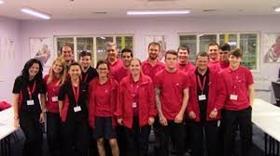
XPO Logistics arrived in the UK in 2015 when it acquired Norbert Dentressangle, which itself had earlier acquired Christian Salvesen and TDG.
XPO UK and Ireland HR director Mark Simmons (pictured) joined Salvesen in 2005, so he has been through the full set of mergers and takeovers, including the latest, which saw XPO complete the acquisition of the majority of Kuehne+Nagel’s UK contract logistics business in January 2021. “It was satisfying to get that accomplished despite Covid and bring a quality team on board.”

XPO Logistics has more than 30 apprenticeship programmes, from GCSE level (level 2) through to a Masters (level 7) and has more than 800 apprentices globally.
“We see apprenticeships as a building block in our overall training package, so we were over the moon to win the award,” says Simmons. “I would say that 75% of our apprentices are on levels 2 or 3. At the top end, we recently started a level 7 programme that has 10 people on it. So, the bulk of the schemes are for operational colleagues and first-line managers, such as shift managers and supervisors.”
Revitalised offering
While XPO’s predecessors in the UK ran some limited apprenticeship schemes, they have expanded significantly in the past five years. “We always had apprenticeship programmes in the business, but at quite a low level of take-up,” says Simmons. “When the Apprenticeship Levy came in [in 2016] we looked at how we could revitalise our offering, to get some return on the levy and restructure all the leadership development programmes to fit the apprenticeship requirements. In the past five years, there has been a significant change in terms of breadth of offering and the number of people on the programmes.”
The entry-level apprenticeship, described as an integral part of its strategy to attract and retain the best people, is aimed at 16- to 24-year-olds; candidates are chosen on character and skills fit, irrespective of background, other qualifications and experience. Each apprentice is matched with a mentor, as well as an ‘apprentice buddy’, to provide guidance and support.

One-to-one reviews and tracker meetings are scheduled to chart progress and identify where extra support is required. Development days bring apprentices based all over the country together, to share experiences and provide another level of support.
XPO also offers a Leadership and Management level 3 apprenticeship, aimed at enhancing first-line management knowledge and skills through classroom-based and distance learning activities. On completion, learners become associate members with the Chartered Management Institute to support their professional career development and progression.
Simmons does not worry that the term ‘apprenticeship’ puts people off management development programmes. “Some people older than the typical 18- to 21-year-old might think ‘I’m 35, I’m in a job, why would I do an apprenticeship?’ So maybe the label does infer it is for a young person,” he reflects. “It is more that issue, rather than the association with training for manual trades.”
Core objectives
XPO’s apprenticeship levy contribution is close to £3m and so the company identified four core strategic objectives for reinvesting levy funds and not allowing the money to go to waste. Existing programmes were enhanced and realigned to ensure standards were being used and the return on its contribution was being maximised; development opportunities were offered to XPO colleagues at all levels and in every function; spending was focused on strategic priorities; and funds were used specifically to recruit entry-level talent by targeting schools.
What is slightly unusual with XPO’s approach to apprenticeships is that while it does use apprenticeships to train HGV drivers and warehouse operatives, it doesn’t see them as suited just to vocational roles.
“Entrants can go down the operational route or go into business administration where they do finance, HR, project management, etc, and touch lots of different activities within the logistics business. They can decide at the end of that where their skills are best placed,” explains Simmons. “They can also get a degree through Hull University, so they can earn, learn and acquire work-related skills that will take them on to a career. For many 18-year-olds, apprenticeships are a brilliant alternative to going to university and coming out with a debt.”

But the bulk of its apprenticeships remain in more traditional vocational roles, such as drivers and warehouse staff. “There is genuine value in using fundamental development programmes in the driver and warehouse population to provide a structured pipeline of talent,” says Simmons. “Getting a return on the levy is a tick, but that is not the reason we do what we do. Drivers and warehouse staff are the core of our business, not senior managers, so it is all about equipping people in
operational roles.”
With a target of filling 60% of all vacancies from within the business – and currently achieving 52% – XPO uses its training schemes to ensure its pipeline is constantly supplying new talent into the business to backfill the roles vacated through staff promotions.
“Having one out of two roles filled internally is one of the biggest competitive differentiators of XPO,” says Simmons. “We recruited more than 2,000 people last year, and to have half of them come from XPO talent is phenomenal. The best example is when we opened a new LVMH warehouse in Milton Keynes two years ago – every one of the 80 people in that start-up was an XPO colleague drawn from a variety of business units and head office. The ability to start an operation with people who know our culture and systems is a huge advantage from a training perspective. That requires all our operational managers to see the whole of XPO as a single talent pool. We don’t want silos.
“We have lots of new business coming on in the first half of this year,” says Simmons. “We will use our pool of skilled people to fill those jobs. We have a pool of implementation and support people at all levels. We have a pipeline of talent, so when we win business, we can assemble a team to move into those roles.”
Diversity and inclusion
Routes into XPO apprenticeship programmes can start at almost any age and diversity has become a major theme in recent years. “We have an entry programme for
school- and college-leavers, a graduate-entry route and a programme for existing and future new hires of any age,” says Simmons. “There has been a real push around diversity and inclusion over the past three years, and I’m delighted that in our 800 apprentices we now have a 50/50 male/female split, which is a great outcome. We have been increasingly successful hiring women graduates, and 17 of the 22 that start this week are female.”
Recruiting more women is arguably only the half the battle as logistics work typically requires structured shifts, while family responsibilities still fall mainly on the female partner. Women are more likely to take career breaks or leave the industry before fulfilling their potential.
“The answer starts with flexibility and the attitude of the people we are hiring,” argues Simmons. “We constantly challenge our operational leaders on how we can have more flexible working practices. At one of the new sites in Milton Keynes we opened last year, for example, the shift patterns were different from the traditional 6am to 2pm, 2pm to 10pm, and any five days from seven, to specifically target different talent pools. We have an afternoon reduced-hours shift from 4.30pm until 9pm so a parent can collect the kids from school, drop them at home then go to work.
“When we are hiring, we ask ‘Can we do it flexibly?’ – we can’t do it in every site, but we are having lots of conversations. The key is to change the mindset in operations – it is easy to have lots of senior women in HR, sales and finance, but it is also important to have, say, four female business unit directors and a good gender mix in the senior ops leadership team.”

XPO has also looked at ways of increasing its ethnic diversity, but has decided against setting specific targets for the profile of its workforce. “We want a meritocracy with the best person for the job regardless of age, gender, ethnicity or sexual orientation,” says Simmons. “Within our talent acquisition and recruitment team we have set targets around shortlist composition in terms of gender and ethnicity. So, there are goals behind the scenes, but we are always picking the best person.
“We also do other things that aren’t that visible to the external world – for example, we partner with certain colleges in areas where there is a great ethnic mix. We try to have a broad offering for all talent.”
Judges’ comments
The MT judges praised the evidence of a clear, positive impact of its apprenticeships on return on investment. A cost-saving task undertaken by 17 Leadership and Management apprentices delivered combined savings in excess of £500,000; delegates effectively generated a return of more than five times the investment made in each of them.
The judges said XPO’s entry was impressive and comprehensive, with an admirable focus on attracting young people and very high retention and pass rates.
The trophy is proudly displayed in Simmons’ office in XPO House in Northampton, and there are plans to build a trophy cabinet in reception to house XPO’s expanding collection. “We love winning awards,” admits Simmons. “We think we do a decent job and when we get external recognition, it means a lot to the team that deliver it, day in, day out.”











